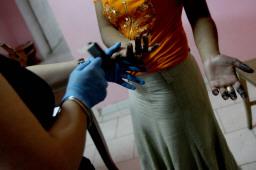Interior Minister Roberto Maroni said Thursday that Italy would continue to take fingerprints during a government census of gypsy camps despite a European Parliament (EP) recommendation to stop.
Maroni said he was ''outraged'' by the non-binding EP resolution on Thursday, which called on Italy to abstain from collecting fingerprints or using those already collected ahead of a full evaluation of the measures by the European Commission (EC).
The EP motion, tabled by a group of left-wing Italian MEPs, held that fingerprinting adults and children in gypsy camps discriminates against race and ethnicity.
It was passed by 336 votes to 220, with 77 abstentions.
But Maroni said the recommendation was based on ''false suppositions'' and that the government plan to deal with gypsy camps was ''a battle for civility''.
''The Italian government will go ahead to the bitter end, in full and complete agreement with the European Commission,'' he said.
''Our aim is to put an end to the disgrace of nomad camps, which are worse than (Brazilian shanty-town) favelas.
''We want to create authorised, controlled camps where people can live in Italy in a dignified manner,'' added the minister, who says fingerprinting will help fight crime and identify illegal immigrants.
Maroni received support from EU Affairs Minister Andrea Ronchi, who referred to the EP vote as ''one of the worst pages in the history of European institutions''.
Foreign Minister Franco Frattini said EP accusations of racism against the Italian government were ''totally unfounded'' and ''motivated by politics rather than any substance''.
''The EP adopted this resolution without waiting for the EC to begin their evaluation, which means they had no interest in hearing whether the measure is compatible with European law. For that reason I am not remotely embarrassed to defend this measure,'' said the former EU Justice Commissioner.
Opposition politicians praised the EP vote, which Shadow Interior Minister Marco Minniti described as ''confirming all of our doubts'' about the ''hateful discrimination'' of fingerprint collection.
''It's an important decision even if it's not binding,'' said Senate Deputy Speaker Emma Bonino of the Radical Party.
''We hope that this vote will help convince some mayors and the Interior Minister (Roberto Maroni) to change their minds,'' she said.
EC TO RECEIVE CENSUS REPORT BY END OF JULY.
European Justice Commissioner Jacques Barrot on Thursday told the EP that Italy would send a full report on measures adopted for the gypsy census by the end of July.
Barrot pledged to collect all information on ''the purpose (of fingerprinting), the legal basis, how they will be preserved and if they will be used for other ends''.
The commissioner also said he had asked for particular clarification on the treatment of minors under the age of 14 and on the situation in the 17 Italian regions not involved in the government's current emergency plan.
So far, the city prefects of Milan, Naples and Rome charged with overseeing the census have taken different approaches to fingerprinting.
In Naples and Milan, where the census is already under way, fingerprints have only been taken from minors between the ages of 14 and 18 in Naples camps.
Milan prefect Gian Valerio Lombardi said fingerprinting will only be used in cases where gypsies refused to identify themselves.
Rome prefect Carlo Mosca said he had ruled out fingerprinting altogether but would require photos of gypsies who refused to identify themselves when the census starts in the capital next week.
In the wake of concerns over public safety, Maroni has pledged to dismantle all illegal camps as well as authorised camps that do not have adequate facilities.
Government plans also call for the expulsion of any immigrant found to be in Italy without the correct paperwork.
The vast majority of the 152,000 gypsies living in Italy are of Romanian origin, while a small percentage come from the Balkans.









